Parentification or infantilisation?
How our restricted view of ‘play’ affects our children’s adult lives
In Ghana, after a 5km school pick-up walk, I was finally getting back into the forest and out from under the blinding, milk-white sky. After an hour of nothing but goats, dust, and squinting, the green and the birdsong was a relief. My children dropped their bags at camp and went to look at lizards. I picked up one of their textbooks and flicked through. “Religious and Moral Education for Basic Pupils” (no comment) has a section on ‘Responsibilities of Children at Home’. Four of the nine listed for the 8-10yrs age group were:
Running errands for parents
Taking care of the home when parents absent
Taking care of younger siblings
Fulfilling all household chores
I put the book back in the bag and thought of the ten-year-olds I knew in the UK. Not one had the skills to take on those responsibilities. But I could hardly blame them. Unlike Ghanaian children, they haven't been involved in contributing to the family from an early age. Ghanaian children don't suddenly acquire these skills on their eighth birthdays. They can take on these responsibilities because they have been practising the skills necessary for years.
The previous day, we'd shared bananas and bofrot (incredible fried dough balls) with a group of men breakfasting in the forest. One of them, Desmond, now lived in England and had raised children there.
“You know, I found it very surprising how, in the UK, you only teach children skills that are, to some extent, optional.” Every word he said was perfectly selected. His voice was soothing, deep, and slow. “You make sure all children can swim, ride a bike, play a sport and a musical instrument. In Ghana, of course we think these are nice skills to have, but we also believe that every child needs to know how to cook, do the laundry, clean the house, shop and run errands, and take care of children. Why does the UK think these skills are optional?”
Desmond had a point. I met many students at university who never learned the life skills he listed. They either had to learn as an adult, find other people to do these things for them, or live in squalor.
But there is a widespread belief in our culture that children will “miss out” by having a purpose and role that takes time away from play, or that if children are expected to contribute to the family, then they are being ‘parentified.’ And ‘parentification’ is an on-trend dirty word in parenting circles.
Parentification is a “long-term violation of intergenerational boundaries” and can be damaging (though it now seems that it’s not so clear-cut because ‘parentified children’ also seem to get some benefits - see ‘notes’ below) . Usually, it involves a parent who is compromised in some way. Friends I know who were parentified as children had parents who were: undergoing messy divorces, lonely, chronically ill, or struggling financially. Parentification involves the violation of boundaries. Helping your child learn to be confident and safe when going unsupervised to the shop or library is not parentification. Letting a child look after younger children when they have demonstrated maturity and appropriate problem-solving is not parentification. Requesting and valuing a child's contribution to the family is not parentification.
But it's really hard for our generation, the generation of parents now, to know what is genuinely age-appropriate for our children to do. Our generation was the first infantilised generation. Our parents, terrified by media fear-mongering, restricted our freedom for fear of abduction; our interactions with adults for fear of paedophiles; and our family participation for fear of accidental injuries or breakages. We were directed to play only with things that had been made unbreakable and appropriate for our incompetence. And then, by the time we were eventually deemed ‘old enough’, we had grown out of that age in which we’d been motivated to learn such things. Our parents had missed the boat. We'd internalised the message that we didn't need to move, or interact with strangers, or help. We never learned the skills we needed for life.
And then when we started university or work, we lacked independence, resilience, self-motivation. We were called ‘sensitive’, ‘snowflakes’, and the term “millennial” itself became an insult. We suffered from record-breaking levels of mental health problems because we didn't learn organically how to be in control of our own lives. We had this responsibility dumped upon us when we became adults, and since then, it has never felt easy.
So now, we're trying to parent our children without these skills and without a cultural understanding of how to help them develop these skills. We think that a child's desire for play means that they need toys, screens, or organised play.
But no other animal that plays (and there are a LOT of them) relies on toys. They all play by acting out life skills. They fight, or chase, or prepare food, or care for each other. They learn. Better play helps children become more successful, healthier adults. Julie Lythcott-Haims (ex-Dean of Stanford and author of ‘How to Raise an Adult’) pointed that out. “One of the key life skills our children must develop, after all, is the ability to live without us,” and one of the most powerful ways to do that is unsupervised play.

Mother Nature has helped us out here and pre-programmed humans with a sequence of timed motivations to help us on this learning journey. Children have, as you may have noticed, an age when they most want to practise caring for babies, an age when they most want to practise cooking meals, an age when they want nothing more than to practise getting into and out of conflict. This is why children love playing with replica versions of adult equipment, but underneath all of the cutesy toy fruit and tiny wooden cutlery, they are trying to learn real skills. If we don’t understand play’s value as a motivator for learning, then we fail to teach them, and they fail to learn real-world skills.
The point was driven home to me when I first arrived in Guyana. I couldn't believe how effective and capable these children in the Amazon rainforest were. I watched a four year old skilfully use a knife to prepare a watermelon. I watched groups of primary school children build and tend fires. I watched multi-age groups of children interact and play for hours without a squabble. Even toddlers went on fishing trips, sitting in the back of the boat and using their own little rod to catch bait fish. All of these skills are learned and practised through play - the survival of the child and family does not depend on it, and the child is not forced to do it. Parents simply allow the child’s desire to learn to manifest as functional play. Michaeleen Doucleff‘s ground-breaking book ‘Hunt, Gather, Parent,’ has a more detailed how-to on this but, in essence, allowing (not forcing) children to be involved in the tasks of daily life can be a very powerful thing.
So what can we do to avoid infantilising our own children?
Let children get bored - Boredom is, for lack of a better word, good. It's nature's motivator. Parents, don’t take games with you when you go to the park or the beach. Don’t get the games out for a play-date. Let kids have a moment to realise that they’ve nothing to do, and create.
NB. Children treated this way from birth can handle any amount of free time. But don’t present untrained newbies with a day-long stretch of nothing. They’ll try hard to find something to fill it, fail, blow their fuses, and drop into helplessness. Which isn’t productive for anyone. Start small. 30 min there. An hour here. And so on.
Limit toys - Parents, childminders, nursery staff, try to make sure that there are few enough toys that kids get bored with them and then come up with new ways to use them. If there are some stand-out toys that everyone wants (resulting in, for example, fights), then the answer is ‘remove that toy’, not ‘buy another one’. Obviously, unstructured toys are better.
Gifts - Grandparents, listen up. Stop giving single-function toys. Give something even better! Ever met a kid who wouldn’t go crazy over being given an entire watermelon or ten feet of rope? Me neither. Up your game and improve your grandchildren’s long-term mental and physical health.
Spartanism - Anything that weakens the consumerist mindset is going to help children have less and become more creative. Influencers, media types, designers, directors, I’m looking at you here.
Electronic media - Consuming electronic media is not play. It’s something else. It has ‘play’ written on it, but provides only about 5% of the value. Parents and teachers, reserve it for learning specific life skills. How to calculate taxes, for example. Touch-typing. Or making an acceptable PowerPoint slide.
Risks - I talk about this a lot. Parents, teachers, planners, etc., consider the long-term cost of your risk aversion on the lives of the children that you are forcing it upon. If you won’t let them play in some ways, they won’t learn some things. Is that going to harm them? Are you sure?
Skills - Adults (and, if possible, teachers), teach children life skills by letting them watch (or, preferably, join in) while you’re doing them. If they don’t start to bring those into play, remind them. As soon as the activities turn up in play, start giving them responsibility for household chores.
Real tools - If you can go one step further and give children adult tools and enough training to use it, then do so. A hammer, nails and pile of bits of wood is a good, cheap start. Similarly, £30 buys a single-ring induction hob, an old pan, and a pair of safety goggles - more than enough to set up on the kitchen floor (where it can’t fall on anyone) and practice making scrambled eggs for the family.
The play industry unsurprisingly wants to sell products or services, and it has shaped our Western views of what play is. We need to remember that most toys distract children from filling their time in more creative ways and learning skills alongside parents and other adults. There’s a world of play beyond toys.
You may also like:
writes about the future of education, and I loved his post about play during education and learning:And if you don’t follow
, the Boston College research professor who specialises in the nature and value of play, then you really should. This was one of my favourite pieces:Prefer a podcast?
Notes
Hunt Gather Parent, by Michaeleen Doucleff, describes how children play and learn in less industrialised cultures - this resonates with what I saw when travelling
How To Raise An Adult, by Julie Lythcott Haines, explores this in a Western culture and with a very US-centric mentality, but it’s well worth a read
Advantages and disadvantages of parentification - https://www.sciencedirect.com/science/article/abs/pii/S0190740922003450




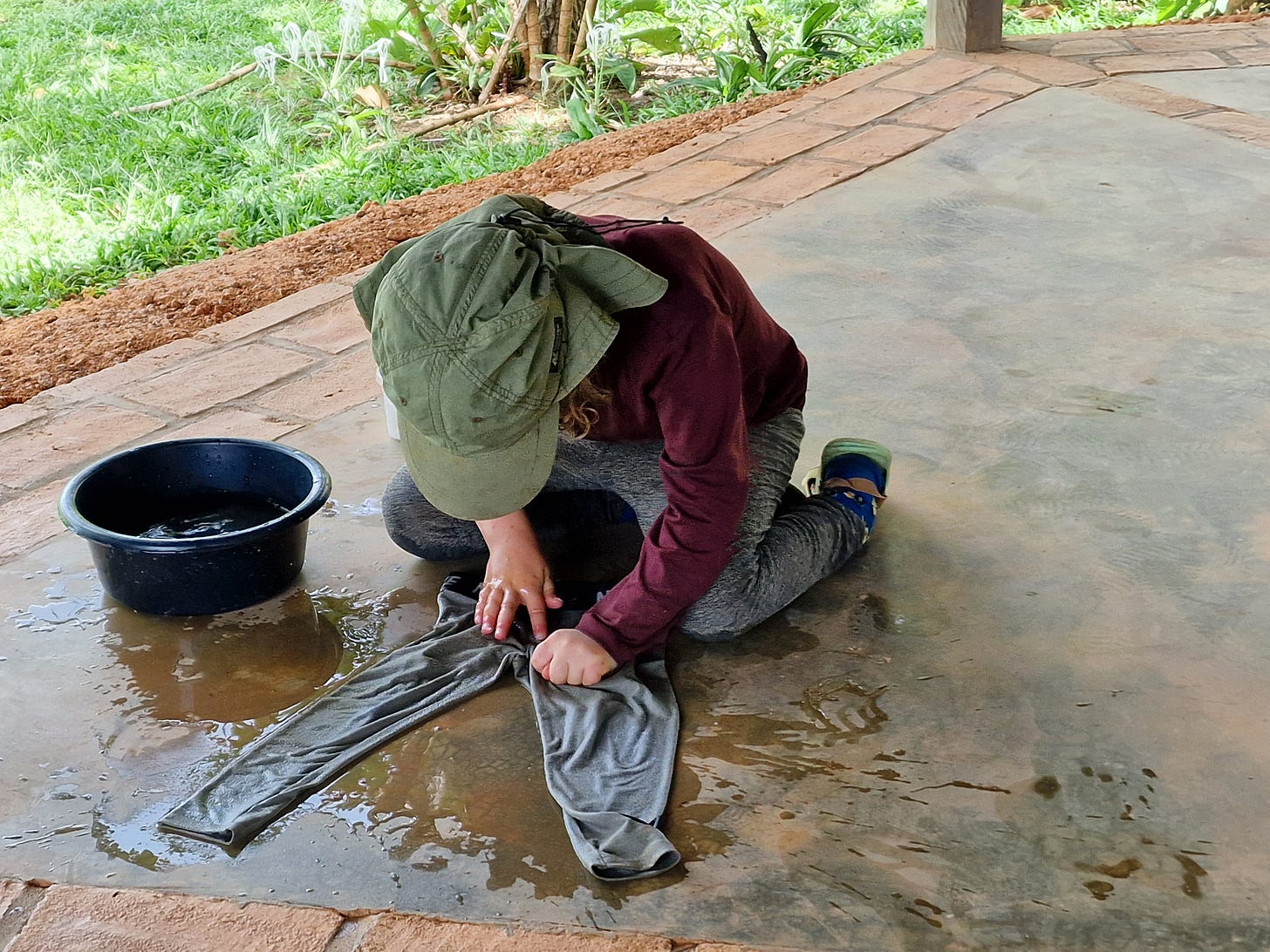

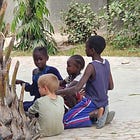
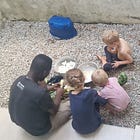
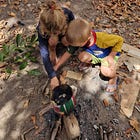

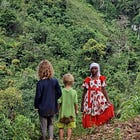



"Give them a whole watermelon."
Why have I never considered this. What a glorious, extravagant, transient gift for a four year old!
I loved this article, Guen. Thank you for writing it. My wife and I read Hunt, Gather, Parent when our oldest son was one and it completely changed the way we parent. It seems amazing what children can do when they are allowed to contribute and learn how to do helpful tasks, but really it's just shocking here in the US because you see it so infrequently. People are astonished when our 18 month old cleans scrapes his plate and puts it in the dishwasher or our 3-year old cracks eggs, scrambles them, and pours them in a pan. I'm not bragging—as you said, these types of things should not be optional skills. They are essential.
The callouts to specific audiences was helpful too—I'll send this to our parents as ammunition in my fight against crap plastic toys as gifts.